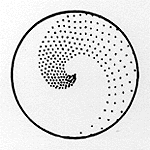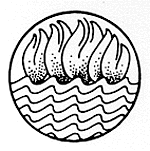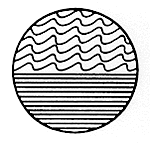
In the physical body, vata--composed of Space and Air--is the subtle energy associated with movement. It governs breathing, blinking, muscle and tissue movement, pulsation of the heart, and all movements in the cytoplasm and cell membranes. In balance, vata promotes creativity and flexibility. Out of balance, vata produces fear and anxiety.

Pitta, made up of Fire and Water, expresses as the body's metabolic system. It governs digestion, absorption, assimilation, nutrition, metabolism and body temperature. In balance, pitta promotes understanding and intelligence. Out of balance, pitta arouses anger, hatred and jealousy.

Kapha is formed from Earth and Water and is the energy that forms the body's structure--bones, muscles, tendons--and provides the "glue" that holds the cells together. Kapha supplies the water for all bodily parts and systems. It lubricates joints, moisturizes the skin, and maintains immunity. In balance, kapha is expressed as love, calmness and forgiveness. Out of balance, it leads to attachment, greed and envy.
Life presents us with many challenges and opportunities. Although there is much over which we have little control, we do have the power to decide about some things, like our diet and lifestyle. To maintain balance and health, it is important to pay attention to these decisions. Diet and lifestyle appropriate to one's individual constitution strengthen the body, mind and consciousness.
The basic difference between Ayurveda and Western allopathic medicine is important to understand. Western allopathic medicine currently tends to focus on symptomatology and disease, and primarily uses drugs and surgery to rid the body of pathogens or diseased tissue. Many lives have been saved by this approach. In fact, surgery is encompassed by Ayurveda. However, drugs, because of their toxicity, often weaken the body. Ayurveda does not focus on disease. Rather, Ayurveda maintains that all life must be supported by energy in balance. When there is minimal stress and the flow of energy within a person is balanced, the body's natural defense systems will be strong and can more easily defend against disease.
It must be emphasized that Ayurveda is not a substitute for Western allopathic medicine. There are many instances when the disease process and acute conditions can best be treated with drugs or surgery. Ayurveda can be used in conjunction with Western medicine to make a person stronger and less likely to be afflicted with disease and/or to rebuild the body after being treated with drugs or surgery.
We all have times when we don't feel well and recognize that we're out of balance. Sometimes we go to the doctor only to be told there is nothing wrong. What is actually occurring is that this imbalance has not yet become recognizable as a disease. Yet it is serious enough to make us notice our discomfort. We may start to wonder if it is just our imagination. We may also begin to consider alternative measures and actively seek to create balance in our body, mind and consciousness.
Ayurveda encompasses various techniques for assessing health. It assesses prodromal symptoms, cardinal signs and symptoms, and one's suitability for treatment to help determine the etiology and pathogenesis of an imbalance. Various methods are utilized to help acquire information during an assessment with a client. These methods include: questioning, observation, palpation, direct perception and inference. Techniques such as taking the pulse; observing the tongue, eyes and physical form; and listening to the tone of the voice are employed during an assessment. Palliative and cleansing measures, if appropriate, can be used to help eliminate an imbalance along with suggestions for eliminating or managing the causes of the imbalance. Recommendations may include: implementation of lifestyle changes; starting and maintaining a suggested diet; and the use of herbs. In some cases, participating in a cleansing program, called panchakarma, is suggested to help the body rid itself of accumulated toxins so it can gain more benefit from various suggested measures of treatment.